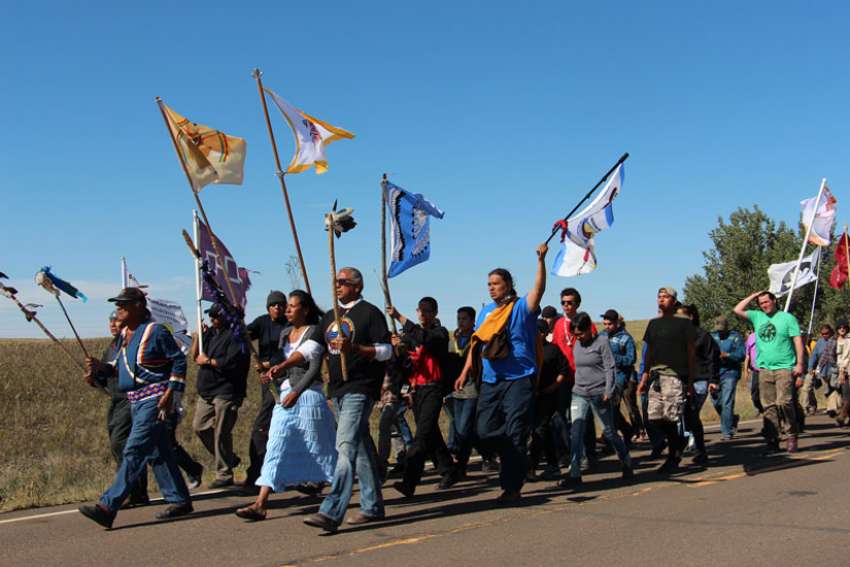That’s one question he hasn’t been asked, and he might demur if pressed on such a specific issue. But in his landmark encyclical on the environment published last year, and in other statements, Francis has strongly supported arguments of the Native American-led resistance movement on three core issues: indigenous rights, water rights and protection of Creation.
The 1,200-mile long pipeline is designed to move oil from the fracking fields of North Dakota to Illinois. The original path of the pipeline ran next to Bismarck, the North Dakota capital, but it was rerouted because of concerns over potential contamination of water supplies.
The new route instead takes it through ancestral Native American lands, including burial grounds, and would cross beneath the Missouri River at the border of the Standing Rock Indian Reservation.
The Sioux native communities object that the current route will threaten their water supply, upset the ecological balance of the region, disrupt tribal traditions and violate sacred lands.
And their anti-pipeline action has been sustained by Native American spirituality.
For months, “water protectors” of many faiths have gathered by the thousands at Standing Rock, engaging in prayerful ceremonies, consciousness-building and, at times, civil disobedience. The Obama administration has temporarily suspended drilling beneath the river, but the company building the pipeline, Dallas-based Dakota Access, has vowed to complete it.
If Francis hasn’t raised this issue specifically, he has been a presence.
In conversations at Standing Rock last month, Sioux tribal leaders noted that the pontiff has been outspoken when it comes to the rights of indigenous peoples who face large-scale development projects. The leaders are keenly aware of the Pope’s words earlier this year: “I want to be a spokesperson for the deepest longings of indigenous peoples … who are threatened in their identity and in their existence.”
Recently, Standing Rock Sioux Tribe Chairman Dave Archambault II sent a letter thanking Francis for his statements, explaining the pipeline battle and asking for the Pope’s prayers.
Francis doesn’t appear to have responded – yet. But in many ways, the Pope’s words in his encyclical Laudato Sì (“On Care for Our Common Home”), issued last year, seem tailor-made for the conflict at Standing Rock.
Consider these passages:
— On development projects and indigenous rights:
“In this sense, it is essential to show special care for indigenous communities and their cultural traditions. They are not merely one minority among others, but should be the principal dialogue partners, especially when large projects affecting their land are proposed. For them, land is not a commodity but rather a gift from God and from their ancestors who rest there, a sacred space with which they need to interact if they are to maintain their identity and values. When they remain on their land, they themselves care for it best.”
— On the overriding right to safe water:
“In any discussion about a proposed venture, a number of questions need to be asked in order to discern whether or not it will contribute to genuine integral development. What will it accomplish? Why? Where? When? How? For whom? What are the risks? What are the costs? Who will pay those costs and how? In this discernment, some questions must have higher priority. For example, we know that water is a scarce and indispensable resource and a fundamental right which conditions the exercise of other human rights. This indisputable fact overrides any other assessment of environmental impact on a region.”
— On the over-dependence on fossil fuels, global warming and Creation as a “common good” that transcends private interests:
“The climate is a common good, belonging to all and meant for all. At the global level, it is a complex system linked to many of the essential conditions for human life. A very solid scientific consensus indicates that we are presently witnessing a disturbing warming of the climatic system. In recent decades this warming has been accompanied by a constant rise in the sea level and, it would appear, by an increase of extreme weather events, even if a scientifically determinable cause cannot be assigned to each particular phenomenon. Humanity is called to recognize the need for changes of lifestyle, production and consumption, in order to combat this warming or at least the human causes which produce or aggravate it. … The problem is aggravated by a model of development based on the intensive use of fossil fuels, which is at the heart of the worldwide energy system.”
The spiritual aspect of the Standing Rock resistance movement is very much on Francis’ wavelength, too.
For example, one of the largest events in early November was a “healing walk” of prayer in which demonstrators asked for “the ability to forgive.” As one speaker said, “We need to do this without anger. We need to do it with prayer.”
In his encyclical, Francis spoke about Christians engaged in political and social movements to protect Creation, saying such actions, “when they express self-giving love, can also become intense spiritual experiences.”
“When we feel that God is calling us to intervene with others in these social dynamics, we should realize that this too is part of our spirituality, which is an exercise of charity and, as such, matures and sanctifies us,” he said.
Native Americans have rarely won last stands, and may not win this one. But their struggle at Standing Rock has made allies among people of many faiths, and should resonate with Catholics who are listening to this Pope’s social teaching.


